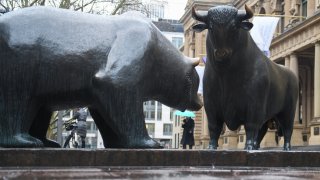
- The pan-European Stoxx 600 index provisionally closed up by 1.2%, with oil and gas shares adding 3.2% to lead the gains as almost all sectors and major bourses entered positive territory.
- The U.S. Congress voted to revoke Russia's trade status and ban oil and gas imports, along with banning all new investment in the country and sanctioning President Vladimir Putin's daughters.
- Volatility continued as investors assessed the pace of the Fed's plans to tighten its balance sheet and hike interest rates to contain runaway inflation.
LONDON — European markets closed higher Friday to end a volatile trading week as investors assessed the pace of the Federal Reserve's monetary tightening plans and news from Ukraine.
The pan-European Stoxx 600 index provisionally closed up by 1.2%, with oil and gas shares adding 3.2% to lead the gains as almost all sectors and major bourses entered positive territory.
In terms of individual share price movement, German digital marketplace Scout24 soared around 14% after a media report about a possible takeover bid.
Get San Diego local news, weather forecasts, sports and lifestyle stories to your inbox. Sign up for NBC San Diego newsletters.
At the bottom of the benchmark, Malta-based online gambling firm Kindred Group sank more than 13% after reporting a 30% drop in first-quarter revenue. The company cited the impacts of its decision to temporarily cease activity in the Netherlands.
The Stoxx 600 closed slightly lower on Thursday despite having been up by around 0.8% at one stage. By Friday, the European blue-chip index was slightly higher for the week.
The past five days have been marked by volatility as traders digested details of the Fed's plans to tighten its balance sheet and hike interest rates to contain runaway inflation.
Money Report
On Wall Street, U.S. stocks mostly rose after staging a late-day comeback on Thursday. But Wall Street was still heading for a losing week.
The U.S. Congress has voted to revoke Russia's trade status and ban oil and gas imports, along with banning all new investment in the country and sanctioning President Vladimir Putin's daughters, after reports of rape and torture against civilians by Russian forces in Ukraine.
The atrocities drew condemnation from G-7 members, who voted to remove Russia from the U.N. Human Rights Council. Ukrainian Foreign Minister Dmytro Kuleba met with G-7 and NATO leaders in Brussels to discuss weapons supply to Ukraine.
The European Union has also approved new sanctions against Russia, including a landmark embargo on Russian coal imports.
David Roche, president of Independent Strategy, told CNBC on Friday that markets had not yet appreciated the potential duration of the war in Ukraine and its economic impacts, in particular central banks tightening monetary policy.
"(Putin) is not going to trade withdrawal for any ratcheting down of sanctions, so the sanctions stay in place and I think the implications for Europe are that you will see recession because the sanctions will actually increase and move towards a total energy blockade," Roche said.
Investors have been closely monitoring central bank comments to assess the likely pace of monetary policy tightening as policymakers try to contain inflation, but Roche suggested any talk of policy rates going "over the hump" in the coming years is "premature."
"When the pain does become extreme on the output and performance, growth side of the economy, of course (central bank interest rates) will slip back, but I think it's going to take a lot longer to happen than the equity market assumes," he said.
Subscribe to CNBC PRO for exclusive insights and analysis, and live business day programming from around the world.






